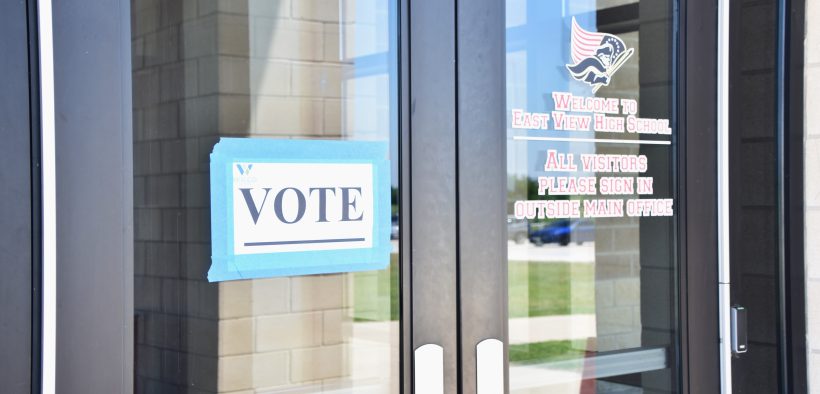Megaphone Interview with GISD Place 7 Candidate Stacy McLaughlin
Share

The Megaphone interviewed GISD Place 7 Candidate Stacy McLaughlin:
Q1: Are you supportive of additional bond measures for funding district initiatives and how do you reconcile this with the increase in paid property taxes?
McLaughlin said that since “[trustees] cannot tell you how to vote…it’s our job to educate the public…so that the public can see it for themselves and see why the district is asking for these bonds.”
Q2: What are your thoughts on the GISD budget and recent deficits in the 2022-2023 and 2023-2024 budgets?
McLaughlin qualified her experience in government, noting that she was a federal government employee for 14 years in the US Army Core of Engineers and said she looks forward to dealing with the budget while in office.
She explained that “The student allotment has not changed since 2019. The state of Texas has not raised that in a few years…when you take into account the inflation we’ve seen in the past few years…the school district has not gotten a raise per student.”
Then, she further detailed how 80% of the budget deals with staffing, “and I can tell you that [the CFO] is working tirelessly to see if they can make things better…to decrease that deficit…and of course, there’s the question about teacher salaries…which they’re focused in on,” to raise teacher salaries while working with a deficit.
Q3: What are your thoughts on the role of fine arts and extracurricular activities in GISD?
McLaughlin emphasized her support for fine arts and extracurricular activities, “They play a major role in shaping students…not all of us are going to go on and be math majors…a lot of us have passions in music and theatre.” She went on, “Once you have a kid who’s in choir…they’re excited about that opportunity in class…it makes going to school that much better…all those programs are critical to the success of students and human beings in general.”
Q4: What are your thoughts on the STAAR test and standardized testing in general in GISD?
McLaughlin noted that she understands the importance of STAAR testing and how it serves as a metric to grade the school, “In layman’s terms…when I go to a restaurant, typically I’m going to see how many stars it has…I get that we need to grade…and the STAAR test is how we do that.”
However, she emphasized that the STAAR test should not be an intelligence assessment, “that doesn’t mean [students are] not capable of moving on…don’t let it define you, don’t let it get you worked up…I don’t want it to define the character of a teacher or student.”
Q5: What is your top priority when you are elected?
McLaughlin mentioned addressing the deficit budget since student allotments have not increased, “I always want to make sure that we never take away programs students are benefitting from…you never want to see welding…or orchestra…go away…I want to make sure we’re protecting the whole child experience.”
She also talked about the importance of mental health, at both school and home, “how do we make sure school is where [students] feel safe and that they have a positive experience…it’s making sure that we can pinpoint when students need a little bit extra attention…to help them as an individual.”
Q6: How do you believe that GISD is responding or should respond to charter schools and the possible implementation of school vouchers?
McLaughlin explained her thoughts on how private and charter schools impact student attrition, “I know Georgetown ISD is running on a deficit budget…it’d be great if we just knew we could get more funding…we are funded on attendance, so every time a student misses it does affect the budget that’s coming in…and when we get more money we can pay staff better.” She also highlighted how class sizes make a difference in retention.
Her explanation for why students should stay in public was that she believes public schools can fulfill a diverse set of needs, “My youngest son has cochlear implants…it is a disability but he is capable of doing all things…but there are cases where he could benefit from sign language…I found that some private schools are reluctant to work in that area…so when I talk to people…I tell them about how public schools take in everyone who comes through the door…public schools are open to everyone in their district and that is not always the case for private or charter schools.”
Q7: Are you concerned about explicit content or literature within GISD libraries or course content?
McLaughlin expressed that she is not concerned, “What I can tell you is that as of today, Georgetown has not had anyone raise concern about course content or library content in our schools…that’s not an issue Georgetown ISD has faced.”
Q8: Do you have any messages for students at Southwestern University in particular?
McLaughlin wished to convey to Southwestern University that, “I think y’all do a really good job of getting involved…I think from a college [student] standpoint, [mentoring] could help a high school student.”
She suggests that students here find opportunities to help and get engaged at the high school level since that can, “help a student find their potential because someone shares their story.”
Q9: Do you want to share any closing thoughts with our readers about this election and the importance of voting in local races?
Closing out the interview, McLaughlin emphasized, “This election currently happening seems minimal because there is no president on the ballot…but this is the city you’re living in…by voting…you’re making a difference in your community’s future.”
Voting Information
More information about where to vote, visit The Megaphone’s look into the Georgetown May 2024 Local Elections.
